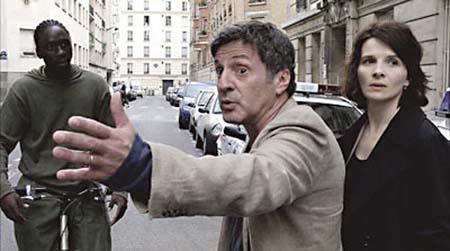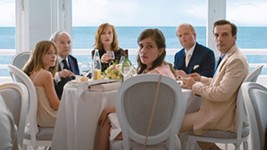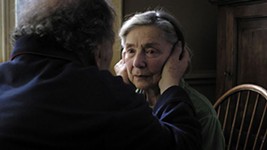
Caché
2005, R, 121 min. Directed by Michael Haneke. Starring Daniel Auteuil, Juliette Binoche, Maurice Bénichou, Annie Girardot, Bernard Le Coq, Walid Afkir, Lester Makedonsky, Daniel Duval, Nathalie Richard.
REVIEWED By Marjorie Baumgarten, Fri., Feb. 17, 2006
The lives we take for granted are indeed fragile things, as is demonstrated in Caché, the European co-production that is directed by the Austrian filmmaker Michael Haneke, who received the Best Director award at last year’s Cannes Film Festival for his work on the film. Haneke is well known for his immaculate and unheroic movies in which the more we get to know his characters the less they seem to become. Some of his recent films include The Time of the Wolf, The Pianist, Code Unknown, and Funny Games – all of which reveal Haneke’s vision of the human condition as a struggle against random obstacles and the negation of our complicity with those who oppress us. Needless to say, his films are not always easygoing, but the journey is nevertheless rewarding for the viewers, if not his characters. Caché, which translates as “Hidden,” witnesses the social unraveling of a erudite and reasonably well-off Parisian couple, whose lies to each other increase as the pressure on them increases from without. Superb performances by Auteuil and Binoche lend nuance and credence to the couple. Caché begins the same way it ends: with a static shot of the façade of a building over which the credits roll. Shortly after the film opens, we realize that we are watching a videotape, and the shot is that of the outside of house where Georges (Auteuil) and Anne (Binoche) live with their adolescent son Pierrot (Makedonsky). Someone has been taping their comings and goings from an unseen perch down the street. More videotapes arrive and come wrapped in childlike drawings of a stick figure with blood gushing from its mouth. The police will do nothing since there is no overt threat, and the couple’s tension and dread steadily increase. They are being stalked but not threatened, and this discomfort with being covertly watched is the fissure that begins to erode their relationship. Georges thinks the tapes may have something to do with a bad thing he did as a child, although he refrains from telling Anne about his suspicion. Once she becomes aware that her husband is harboring secrets, she wonders what else he is hiding. When Pierrot stays out at a friend’s overnight without calling home, his parents have a couple of French Algerians they suspect called to the police station. Fear breeds suspicion, and vice versa. One of the lovely aspects of Caché is the way that it acknowledges how the trappings of good breeding and social conscience break down in the face of this kind of diffuse, generalized threat. Caché can be seen as a harbinger of the immigrant riots that occurred throughout France last year, or perhaps a warning about the ever-increasing surveillance that’s become commonplace – and legal – in the U.S. Caché provides no clear-cut answers about who the perpetrator of the tapes may be, although I’m told that there is a clue revealed in the closing static shot (although I have yet to see it despite three viewings). Nevertheless, what’s compelling about Caché is not the answer to the whodunit but Haneke’s exacting invocation of palpable tension.
A note to readers: Bold and uncensored, The Austin Chronicle has been Austin’s independent news source for over 40 years, expressing the community’s political and environmental concerns and supporting its active cultural scene. Now more than ever, we need your support to continue supplying Austin with independent, free press. If real news is important to you, please consider making a donation of $5, $10 or whatever you can afford, to help keep our journalism on stands.
Richard Whittaker, Dec. 21, 2017
Marjorie Baumgarten, Jan. 25, 2013
Caché, Michael Haneke, Daniel Auteuil, Juliette Binoche, Maurice Bénichou, Annie Girardot, Bernard Le Coq, Walid Afkir, Lester Makedonsky, Daniel Duval, Nathalie Richard









